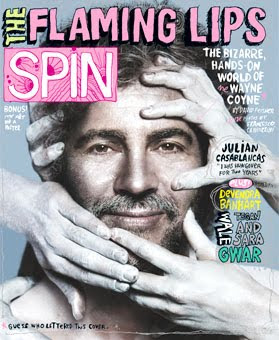
2012, and the Earth finally crumbles. Relax, it's just a movie. Photograph: Columbia Pictures
When Columbia Pictures launched a marketing campaign for 2012 – the latest disaster movie from serial Earth molester Roland Emmerich, where the planet, played by America, is set for impending doom – they didn't do it by halves.
First, there was a teaser trailer showing a tsunami crashing over the Himalayas. The Earth was going to end in 2012, it said, and the world's governments aren't doing enough to prepare us. Search "2012", it said, for "the truth" (the "truth" turned out to be over 1,000 real websites and 175 real books obsessed with 2012 as the end of time).
Then, there was a fake website – the "Institute for Human Continuity" – which consisted of a screen stating that for 25 years they'd been assessing threats to the continuation of mankind, and the results were in.
The "odds of global destruction" in 2012 had been confirmed at 94% (goodbye mortgage) and "to ensure your chance of survival, register for the lottery". In other words, it was a web campaign that seemed to say: "Look, the end of time might actually be coming, so enjoy a film about it why you still can, yeah?"
Many didn't get the joke. Tens of thousands from all over the world panicked, called Nasa, wrote letters – couldn't they do some saving of people too?
'People are really, really worried about the world coming to an end. Kids are contemplating suicide. Adults tell me they can't sleep'
 Photograph: Columbia Pictures
Photograph: Columbia Pictures "I think people are really, really worried about the world coming to an end," said David Morrison of Nasa. "Kids are contemplating suicide. Adults tell me they can't sleep and can't stop crying."
Indeed, Nasa got so many queries, they set up a specific site to deal with them. Yet perhaps even more worryingly, 2012 is not alone. Following the success of Blair Witch, nearly every film worth its celluloid now has its own teaser campaign, web mystery, and viral marketing push, and even the simplest promotional campaign can have unexpected consequences.
For the independently made 2008 animated fantasy Delgo – featuring the voices of Freddie Prinze Jr and Jennifer Love Hewitt – they hit upon the idea of launching "Digital Dailies", where a crack team of animators would whet the public appetite by posting their handiwork as they went. It seemed to work: the videos were getting up to half a million hits a month. Yet, sadly, it seemed most of those were in the industry; they liked what they saw, and began poaching the film's best talent. The director, Marc F Adler, was forced to resort to hiding their identities with aliases.
"It was brilliant as viral marketing," says Adler, "but terrible for making a film."
The "brilliance" of the viral marketing also proved questionable. On a reported budget of $40m, the film's box-office taking was one the worst ever for widely released film (it opened on 2,160 screens), taking just $694,782. According to Yahoo Movies, that works out as roughly two viewers for every screening.
To be fair, their teaser trailer – "From a Studio Nowhere Near Hollywood … From People You've Never Heard of … Comes a Myth for the New Millennium … Delgo" – probably didn't help either.
Yet if that was unexpected, some campaigns just cry out for trouble. Take the case of 2008 indie horror film A Beautiful Day. Set for its debut at an independent film festival in Muskogee, Oklahoma, the makers posted a teaser on YouTube, which featured a sinister synthesized voice saying: "People of Muskogee. Open your eyes. April 25th is a day you'll come to remember", including the message "the end is coming". But 25 April was also the prom night for the local high school. The scared students called the Muskogee police, who assumed it was a terrorist threat, and called in the FBI. Outcome: their film was swiftly booted out of the festival.
And in the world of suspect virals and dodgy publicity stunts, it seems terror threats can come from anywhere. The Cartoon Network's guerilla marketing for cartoon Aqua Teen Hunger Force saw them install LED displays depicting the show's "Moonieites" – 2D aliens from the moon – in 10 major cities across America. In Boston, however, they didn't get the gimmick. Authorities considered the Moonieites suspect devices, which sparked a major bomb scare, caused the closure of roads and posed the question: would al-Qaida really plant bombs that glowed in the dark?
"It had a very sinister appearance," said Attorney General Martha Coakley, adding "It had a battery behind it and wires."
'There are always going to be problems with unbranded campaigns; people may not get the connection to the film, and people fear the unknown'
 Photograph: Joe Lederer
Photograph: Joe Lederer Of course, ill-judged glowing figurines are one thing.
But even ill-thought-out poster campaigns can wreak havok. To promote Forgetting Sarah Marshall, unbranded posters were put up all over the US, saying things like "You suck, Sarah Marshall", and "My mother always hated you, Sarah Marshall". Which sounds like great fun – unless your name is Sarah Marshall of course, many of whom assumed they were the victim of a hate campaign.
As student Sarah Marshall, of Fort Worth, Texas, told the LA Times: "I got a lot of emails and phone calls asking if my boyfriend and I were OK." Some Sarah Marshalls even struck back with posters of their own: "You suck, Judd Apatow," they responded, citing the film's producer.
Even the obviously fanciful bus-station posters for recent sci-fi hit District 9 – featuring a crossed-out alien, text saying "Bench for humans only", and a request for alien sightings – saw the marketing team get more that they bargained for. Tens of thousands called the hotline with sightings, assuming it was a real request.
"There are always going to be problems with unbranded campaigns," says Dan Koelsch, managing editor of MovieViral.com, "because people may not get the connection to the film, and people fear the unknown."
Yet with studios looking at ever more innovative ways to market films, it inevitably leads to more innovative ways to cock up.
"Sometimes studios try too hard, to the point where people can smell the desperation," says Sean Dwyer, editor of filmjunk.com. "That's when it doesn't really work."
The desperation ponged when 20th Century Fox, looking for a way to market this year's rom-com I Love You, Beth Cooper, paid a high school student, Kenya Mejia, $1,800 to profess a secret passion for a classmate during her graduation address (which she did, bellowing: "I cannot let this opportunity just pass by. I love you, Jake Minor!").
The idea was that Fox would video the moment – which recreates a key scene in the film – post it on YouTube, and create viral buzz that the movie was inspiring copycats. It didn't work due to a) Mejia blabbing to the Wall Street Journal, b) Her already having a boyfriend, who wasn't Jake Minor, and c) The film hadn't even been released when she was supposed to have copied it. The film bombed, and a month after the video was posted, it had attracted less than 2,000 views.
If that was treading on suspect moral ground, it didn't come close to New Line's marketing push for 2006 adult crime drama Running Scared starring Paul Walker – a tale of the Russian mafia, bent cops, paedophiles, hookers and men being chased around with really big machetes. What did they do? Made a promotional online game from it, of course, in which players re-enacted not just the film's main action scenes ("A man points a .38 revolver at another man's crotch and fires it, blowing his crotch apart," notes the Parent's Guide section of IMDb of said action, in a list that goes on for six pages) but the more intimate moments too, including Walker's character performing oral sex.
Needless to say, conservative America wasn't too happy when they realised little Timmy was performing online cunnilingus, and pressure from the National Institute on Media and the Family saw the site swiftly shut down.
Still, a really good teaser campaign, well judged, and executed, should work wonders, right? Not always. The campaign behind Mike Myers comedy The Love Guru was brilliant, spot-on, did everything right.
"It was a fully fledged effort to position Myers's character as a real guy, or at least flesh out his backstory," explains Chris Thilk, editor of MovieMarketingMadness.com. "But it wound up being funnier than the movie".
Stuart McGurk
The Guardian Saturday 14 November 2009




































